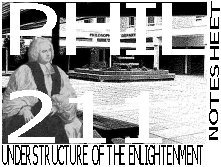 Kant 1
Kant 1 Kant 1
Kant 1Kant rejected the atomic conception of the mental world that set the agenda for early Modern philosophy. For him there was a 'structuring' element.
Where did Kant think the 'structuring' of experience came from?
It is anyway highly significant, Kant thinks: we owe to it (to our 'concepts'), the world as we know it.
What possibilities are there?
Kant thought knowledge of the 'structuring element' belonged to the synthetic a priori.
We may be tempted to think of Kant as describing the concepts as contributed by our 'cognitive apparatus' or 'conceptual framework'.
Analogy: Rose coloured spectacles.
Kant would then be doing some kind of psychology. It is actually pretty clear though that he didn't think this was what he was doing.
'It is possible to imagine kinds of world very different from the world as we know it. It is possible to describe types of experience very different from the experience we actually have. But not any purported and grammatically permissible description of a possible kind of experience would be a truly intelligible description. There are limits to what we can conceive of, or make intelligible to ourselves, as a possible general structure of experience. The investigation of these limits, the investigation of the set of ideas which forms the limiting framework of all our thought about the world and experience of the world, is, evidently, an important and interesting philosophical undertaking. No philosopher has made a more strenuous attempt at it than Kant.' Strawson, The Bounds of Sense, p.15.
The core of the argument is in the 'Transcendental Deduction of the Categories': 'that section of the Critique which cost Kant, and costs his readers, the greatest labour, being one of the most abstruse passages of argument, as also one of the most impressive and exciting, in the whole of philosophy.' Strawson, p.25.
Reading Kant as though he were engaged in the project of laying out the relations between our fundamental concepts, we can identify the following as among the exciting propositions propounded or sponsored (Strawson's formulations):
1. that experience essentially exhibits temporal succession (the temporality thesis).
2. that there must be such unity among the members of some temporally extended series of experiences as is required for the possibility of self-consciousness, or self-ascription of experiences, on the part of a subject of such experiences (the thesis of the necessary unity of consciousness).
3. That experience must include awareness of objects which are distinguishable from experiences of them in the sense that judgements about these objects are judgements about what is the case irrespective of the actual occurrence of particular subjective experiences of them (the thesis of objectivity).
4. (that the objects referred to in (3) are essentially spatial.)
5. that there must be one unified (spatio-temporal) framework of empirical reality embracing all experience and its objects (the thesis of spatio-temporal unity).
6. that certain principles of permanence and causality must be satisfied in the physical or objective world of things in space (the thesis of the Analogies).
VP